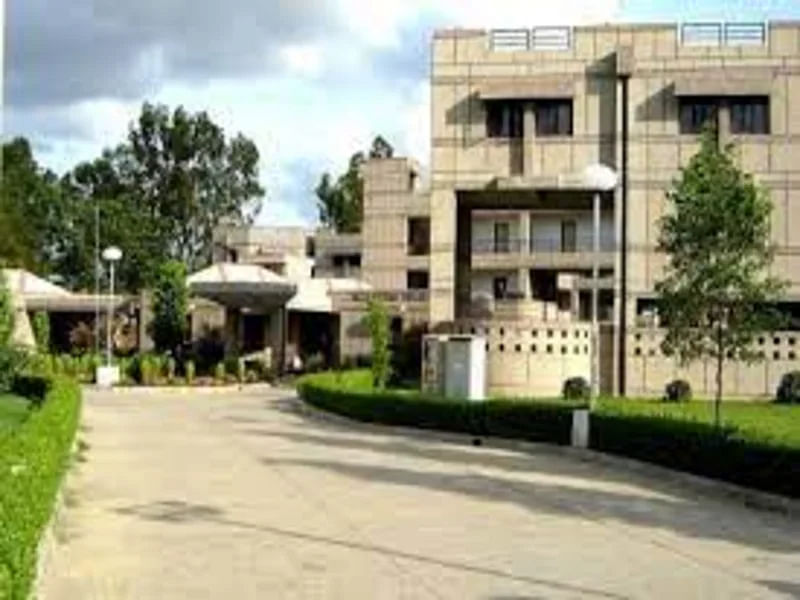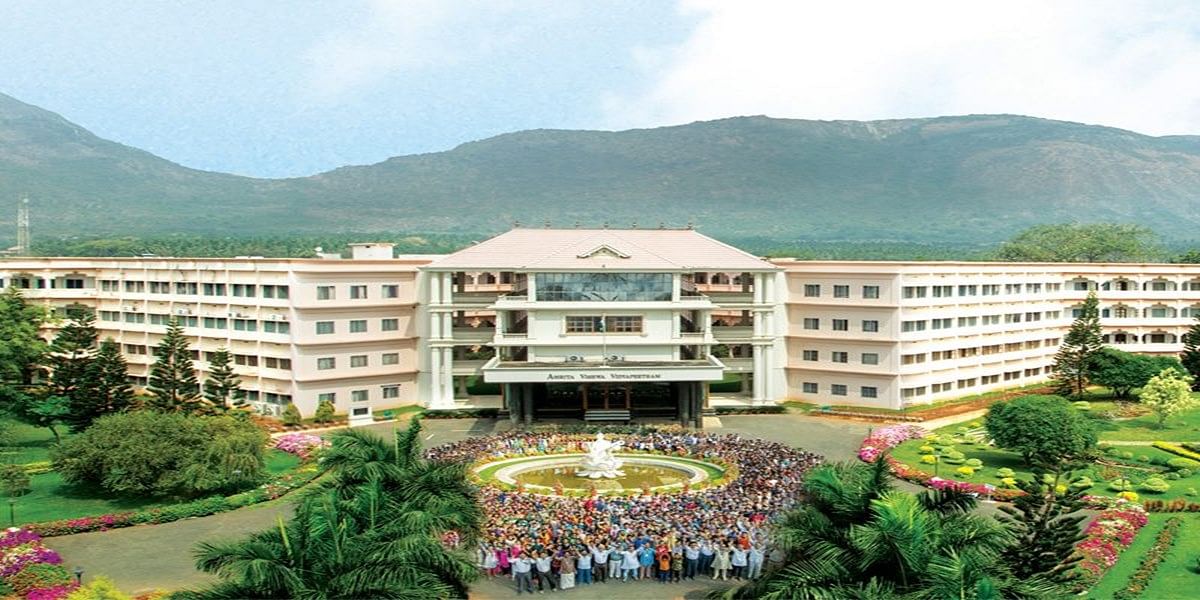BSc Physics: Course Details, Eligibility, Fees, Admission, Duration

BSc Physics is a three-year undergraduate programme that focuses on equipping students with practical and theoretical knowledge related to the fundamentals of physics and its different properties like energy or force. BSc in Physics syllabus core subjects include Properties of Matter and Mechanics, Oscillation, Thermodynamics, Electricity, Magnetism, etc, to enable the students to understand the concept of physics through various practical applications.
BSc Physics eligibility criteria are that the candidate must have completed 10+2 with at least 50% aggregate marks from any recognised university with Physics, Chemistry and Mathematics as mainstream subjects. In addition to that, the candidate must also qualify for entrance examinations such as GSAT, IISER, BHU UET, CUET, etc as per the college admission criteria.
The B.Sc Physics fees per year range from INR 5,000 - 2,00,000 based on the college location, infrastructure, placement opportunities, etc. The BSc Physics fees in private colleges range from INR 50,000 - 2,00,000 per year whereas the fee range in government colleges is INR 5,000 - 40,000 per year.
Table of Contents
- What is BSc Physics Course?
- BSc Physics Eligibility Criteria
- Why Choose a B.Sc Physics Course?
- BSc in Physics Admission Process 2024
- BSc Physics Entrance Exams
- Top BSc Physics Colleges in India with Fees
- BSc Physics Syllabus and Subjects
- BSc Physics Vs BSc Chemistry
- Courses After BSc Physics
- Career Options After BSc Physics
- Salary of a BSc Physics Graduate
- Top 5 Cities to Pursue BSc Physics Course in India
- BSc Physics Scholarships in India
- Skills to Excel as a BSc Physics Graduate
BSc Physics Course Details
| Degree | Bachelors |
| Full Form | Bachelor of Science in Physics |
| Duration | 3 Years |
| Age | Minimum age limit is 17 years. |
| Minimum Percentage | 50% for general category and 45% marks for reserved category in 10+2. |
| Average Fees | INR 5,000-2,00,000 per year |
| Similar Options of Study | B.Sc (Applied Physics), B.Sc (Mathematics), B.Tech (Physics) etc. |
| Average Salary | INR 2 - 7 LPA |
| Employment Roles | Physicist, Research Associate, Research Scientists, Radiology Technician, etc. |
| Top Recruiters | ISRO, DRDO, Bhabha Atomic Research Centre (BARC), TCS, Infosys, Wipro, etc. |
What is BSc Physics Course?
BSc Physics full form is Bachelor of Science in Physics. The BSc Physics course duration is three years and focuses on the fundamentals of physics such as Sound waves, Applied acoustic, Ultrasonic Power supply, Electromagnetic waves, etc. BSc Physics course falls under the umbrella of BSc Courses.
B.Sc Physics graduates can opt for job roles such as Physicist, Research Associate, Lab Assistant, Subject Matter Expert, Academic Counsellor, Physics Lecturer, etc in various industries such as Research and Development, Healthcare, Logistics, Education Technology, automobiles, information technology, etc. The average BSc Physics salary is in the range of INR 2-7 LPA.
BSc Physics Eligibility Criteria
The eligibility for BSc in Physics is that the candidate must meet certain requirements such as merit score, age limit, subject requirements, etc. Listed below is the B.Sc Physics requirements for admission:
- The candidate must have secured at least 50% marks in 10+2 with Physics, Chemistry and Mathematics as mainstream subjects from any recognized board. The candidate must also qualify for entrance examinations such as CUET, GSAT, BHU UET, etc as per the college admission criteria.
- The minimum age limit for BSc Physics admission is 17-18 years
Why Choose a B.Sc Physics Course?
BSc in Physics course has a good scope in the global market with the increasing demand for skilled graduates in various fields such as electronics, automobile, logistics, etc. Listed below are the important facts on why choosing a BSc Physics course can be the right choice:
- As per the Bureau of Labor Statistics 2022 survey, the job outlook for Physics graduates is expected to grow at the rate of 5% between the year 2022-2032
- About 1,500 job openings have been created every year on average over the past decade for Physics graduates
- As per the report by Global Market Analysis, the global medical physics market stands at a net worth of US$ 4.74 Bn and is projected to grow at a 6% CAGR between 2022-2028 and is expected to reach US$ 6.81 Bn by 2028
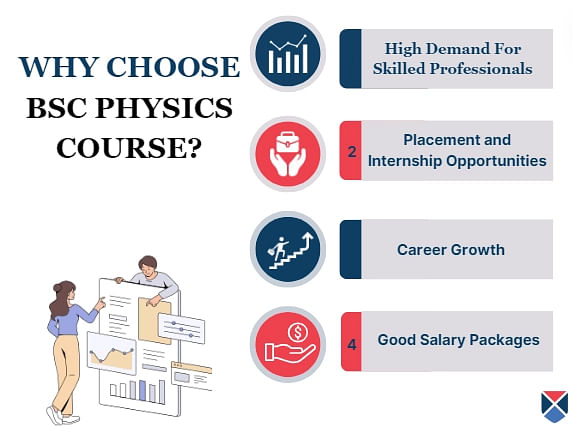
BSc in Physics Admission Process 2024
The BSc Physics admission process is done either through the merit score of the previous qualifying examination or based on the entrance examination score as per the college admission criteria. Listed below is the step-by-step BSc in Physics admission process:
- Step 1: The candidates must meet the eligibility criteria for the BSc Physics course as mentioned above
- Step 2: Appear for the entrance examination as per the preferred college admission criteria
- Step 3: The application process can be carried out either in online or offline mode
- Step 4: Once the merit list is out, the candidates can proceed with submitting documents such as mark sheets, ID proof, and certificates for verification.
- Step 5: After document verification, candidates can proceed with fee payment to confirm admission.
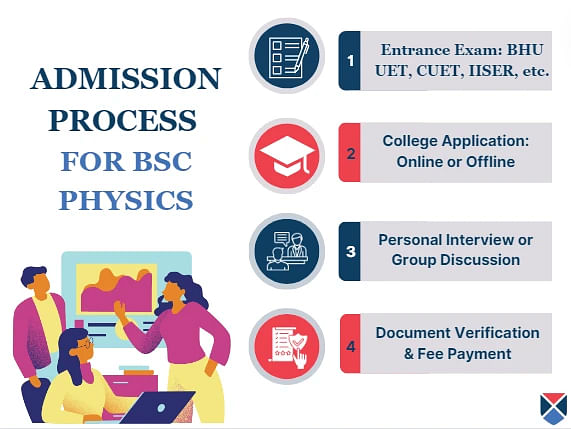
BSc Physics Entrance Exams
In a few colleges such as the Indian Institute of Science Education and Research, and Banaras Hindu University, etc conduct entrance examinations such as IISER, BHU UET, CUET, etc for admissions into BSc Physics courses. Listed below are the entrance exam for BSc in Physics and their registration details:
|
BSc Physics Entrance Exam |
Registration Date |
Accepting Colleges |
|
27 Dec 2023 - 10 Feb 2024 |
Banaras Hindu University |
|
|
19 Feb 2024 |
Christ University, Amity University, Hindu College |
|
|
April 2024 |
Indian Institute of Science Education and Research |
|
|
31 Dec 2023 |
Alagappa University, Amity University, Central University of Rajasthan |
Top BSc Physics Colleges in India with Fees
The average B.Sc Physics fees in India is INR 5,000 - 2,00,000 per year based on the infrastructure, location, lab facilities, placement opportunities, etc. Private colleges such as Amity University, Lovely Professional University, Madras Christian College, etc, and government colleges such as Jamia Millia Islamia, Indian Institute of Science Education and Research, Delhi University, etc. offer BSc in Physics courses.
Listed below are the top colleges in India offering BSc Physics courses and their fee details:
|
NIRF Ranking 2023 |
Name of the College |
Admission Fees |
BSc Physics Tuition Fees (Per Year) |
Miscellaneous Fees |
|
1 |
INR 500 |
INR 19,200 |
INR 17,500 |
|
|
2 |
INR 25,000 |
INR 67,000 |
- |
|
|
7 |
INR 1,000 |
INR 13,300 |
INR 5,000 |
|
|
11 |
INR 10,000 |
INR 22,500 |
INR 1,00,000 |
|
|
37 |
INR 1,000 |
INR 6,350 |
INR 8,000 |
|
|
67 |
- |
INR 19,000 |
INR 5,000 |
|
|
79 |
INR 2,090 |
INR 33,000 |
INR 2,500 |
|
|
- |
INR 1,200 |
INR 1,00,000 |
INR 3,700 |
|
|
- |
INR 10,000 |
INR 40,000 |
INR 20,000 |
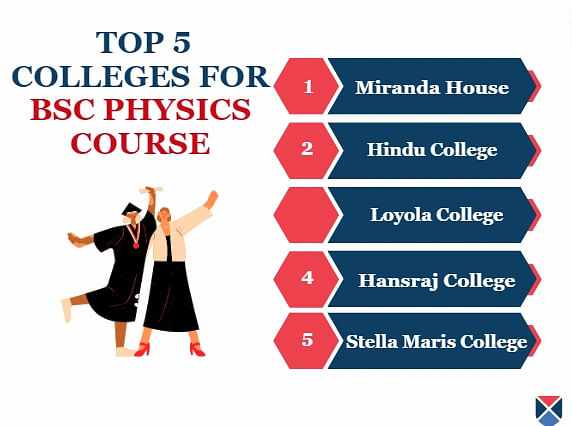
Top City-Wise BSc Physics Colleges in India
Listed below are city-wise BSc in Physics colleges in India and their average fee details:
|
Location |
BSc Physics Fees Per Year |
|
INR 5,000 - 60,000 |
|
|
INR 10,000 - 42,000 |
|
|
INR 5,000 - 35,000 |
|
|
INR 5,000 - 1,40,000 |
|
|
INR 4,000 - 22,000 |
|
|
INR 9,000 - 33,000 |
|
|
INR 20,000 - 1,50,000 |
|
|
INR 6,000 - 90,000 |
|
|
INR 5,000 - 60,000 |
BSc Physics Syllabus and Subjects
BSc Physics syllabus is designed to impart a practical and theoretical understanding of the fundamental concepts of Physics through various subjects and topics such as electromagnetism, Quantum Mechanics, Electromagnetic theory, Atomic and Molecular Physics, etc.
Listed below is the semester-wise BSc Physics syllabus:
|
Semester-I |
Semester-II |
| Mechanics-I | Allied Mathematics – II |
| Electricity and Magnetism | Mechanics-II |
| Allied Mathematics-I | Environmental Science |
| Properties of Matter and Acoustics | Thermal Physics and Oscillations |
| - | Optics |
| - | Electro-Magnetic Induction and Electronic Devices |
|
Semester-III |
Semester-IV |
| Allied Chemistry-I | Allied Chemistry-II |
| Mathematical Physics-II | Mathematical Physics-III |
| Thermal and Statistical Physics | Digital Systems and Applications |
| Sound Waves, Applied Acoustic, Ultrasonic and Power Supply | Physical Optics-II |
| Analog Systems and Application | Modern Physics Elements |
| Practicals | Practicals |
|
Semester-V |
Semester-VI |
|
Mathematical Physics |
Statistical Mechanics |
|
Classical Mechanics |
Solid State Physics |
|
Quantum Mechanics |
Elements of Nuclear Physics |
|
Electronic Devices and Circuits |
Atomic Physics and Laser |
|
Electromagnetic Theory |
Topics in Modern Physics |
|
Practicals |
Practicals |
BSc Physics Vs BSc Chemistry
The BSc Physics course is designed to equip the students with knowledge and skills related to electromagnetism, thermodynamics elements of nuclear physics, etc. whereas the BSc Chemistry is a three-year undergraduate course that focuses on the fundamental concepts of chemistry such as Inorganic Chemistry, thermodynamics, organic chemistry, etc.
Listed below is the comparison between B Sc Physics and BSc Chemistry based on various parameters:
|
Course |
BSc Physics |
BSc Chemistry |
|
Full Form |
Bachelor of Science in Physics |
Bachelor of Science in Chemistry |
|
Course Duration |
3 Years |
3 Years |
|
Course Overview |
B.Sc in Physics focuses on subjects such as electromagnetism, atomic energy, statistical mechanism, mechanics and relativity, etc. |
BSc in Chemistry focuses on topics such as Enzymes and Lipids, Inorganic Chemistry, Qualitative Analysis, Physical Chemistry, etc |
|
Eligibility Criteria |
50% in 10+2, with Physics, Chemistry and Mathematics as compulsory subjects |
50% in 10+2, with Physics, Chemistry and Mathematics as compulsory subjects |
|
Course Fees Per Year |
INR 5,000 - 2,00,000 |
INR 8,000 - 3,00,000 |
|
Entrance Exam |
CUET, IISAR, GSAT |
CUET, BHU UET, IPU CET |
|
Top Colleges |
Fergusson College, IISC, Ramjas College |
Hindu College, Miranda House, Loyola College |
|
Job Roles |
Research Associate, Laboratory Assistant, Physicist, Subject Matter Expert |
Chemist, Pharma Assist, Clinical Research Specialist, Academic Counsellor |
|
Average Salary |
INR 2-7 LPA |
INR 3 - 7 LPA |
Courses After BSc Physics
After completing the BSc in Physics course, students can opt for higher education in the field of Physics to enhance their knowledge and skills further. Pursuing higher studies will also help the candidates in getting better job opportunities. Listed below are some of the courses students can opt for after BSc Physics:
- MSc Physics
- MSc Applied Mathematics
- M.Phil in Physics
- PhD Physics
- MSc Applied Physics
- MA in Engineering Physics
Career Options After BSc Physics
BSc Physics scope is enormous in various fields such as Research and Development, Automobile, Electronics, Healthcare, etc. The graduates are hired by both private and public sector companies in India in job roles such as Academic Counsellor, Research Associate, Lab technician, etc.
Listed below are the BSc Physics job roles along with their job descriptions and hiring companies:
|
BSc Physics Job Roles |
Job Description |
Hiring Companies |
|
Subject Matter Expert |
Responsible for fact-checking and proofreading the details of the document as per the client's requirements, legislation and law. |
TCS, Amazon, Concentrix |
|
Academic Counselor |
Provides counselling to parents and students to assess and diagnose any mental health issues and create awareness of mental health well-being. |
Vendantu, UpGrad, CollegeDekho |
|
Physicist |
Studies and research on the interaction of matter and energy through various tests and experiments |
TCS, KPMG, SRM Institute of Science and Technology |
|
Research Associate |
Researches new designs, materials and instruments for their quality, feasibility, and benefits and approves them for development. |
Accenture, Crisil, Microsoft |
|
Lab Assistant |
Responsible for withdrawing the samples, and performing diagnostic tests and documentation in a laboratory setting. |
Manipal Hospitals, Dr. Lal PathLabs, Apollo Hospitals |
|
Statistician |
Generally work with a large set of data and numbers to analyse and interpret the trends to make business decisions. |
Epsilon, Novartis, Chegg |
Top Recruiters for BSc Physics Graduates
Tabulated below are the top recruiters for BSc Physics graduates in India:
|
Accenture |
Microsoft |
TATA Motors |
|
Tata Consultancy Services |
Epsilon |
Chegg |
|
Novartis |
Apollo Hospitals |
Manipal Hospitals |
|
KPMG |
Vedantu |
Amazon |
|
Concentrix |
Wipro |
Dr. Lal PathLabs |
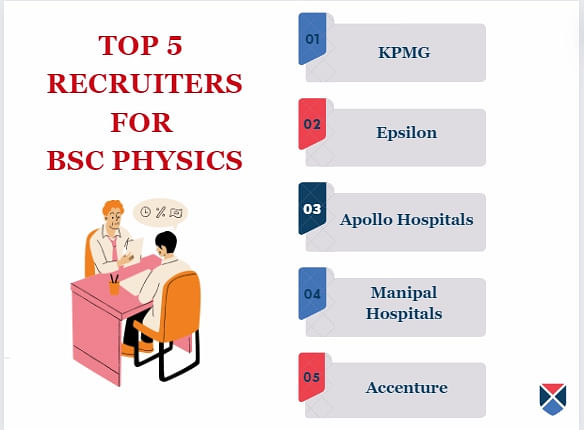
Salary of a BSc Physics Graduate
The average B.Sc Physics salary ranges from INR 2-7 LPA based on domain expertise and experience. The salary range can go up to INR 12 LPA with 3+ years of working experience in the relevant field. Listed below is the BSc Physics salary for various job roles based on the experience:
|
B.Sc Physics Job Role |
Average Entry-Level Salary |
Salary After 3+ Years of Experience |
|
Subject Matter Expert |
INR 5.3 LPA |
INR 8.5 LPA |
|
Research Associate |
INR 4.5 LPA |
INR 7.7 LPA |
|
Physicist |
INR 4.8 LPA |
INR 6.3 LPA |
|
Laboratory Technician |
INR 3.1 LPA |
INR 4.5 LPA |
|
Statistician |
INR 5.8 LPA |
INR 9.5 LPA |
|
Academic Counselor |
INR 4.2 LPA |
INR 6.5 LPA |
|
High School Teacher |
INR 2.3 LPA |
INR 4.2 LPA |
Top 5 Cities to Pursue BSc Physics Course in India
Candidates can choose to pursue BSc Physics courses in top cities such as Chennai, Bangalore, Mumbai, Delhi, etc in prestigious universities such as Fergusson College, Ramjas College, Loyola College, etc. for better placement opportunities.
Listed below are the top 5 cities in India to pursue a BSc Physics course based on the cost of living, average fees, infrastructure, exposure, etc.
|
Cities |
Top Colleges Offering B.Sc Physics. Course |
Average Living Expense |
Average Starting Salary |
Top Recruiters |
|
Chennai |
Loyola College |
INR 15,00-25,000 Per Month |
INR 14,000 - 35,000 Per Month |
Apollo Hospitals, Tata Capital, Sutherland |
|
Delhi |
Hindu College |
INR 12,000-15,000 Per Month |
INR 15,000 - 30,000 Per Month |
Accenture, Metlife, Genpact |
|
Bangalore |
Christ University |
INR 10,000-20,000 Per Month |
INR 20,000 - 50,000 Per Month |
IBM, Tata Motors, Infosys |
|
Mumbai |
St.Xavier’s College |
Up to INR 30,000 Per Month |
INR 15,000 - 33,000 Per Month |
Randstad, Abbott, IBM |
|
Pune |
Fergusson College |
INR 15,000-30,000 Per Month |
INR 22,000 - 40,000 Per Month |
Deutsche Bank, BNY Mellon, Accenture |
BSc Physics Scholarships in India
Many educational institutions, NGOs and government offer scholarships to BSc Physics students based on certain criteria such as annual income, quota, merit score, etc, Listed below are some of the BSc Physics Scholarships and their benefits:
|
BSc Physics Scholarship |
Eligibility Criteria |
Amount |
|
The Tata Capital Pankh Scholarship Programme 2024 |
Must be an Indian Citizen |
Full Tuition Fee Waiver |
|
Narotam Sekhsaria Scholarship Programme |
Must be an Indian citizen under the age of 30 pursuing an undergraduate degree |
Maximum of 20 Lakhs |
|
Indira Gandhi Scholarship for Single Girl Child |
Must be a single girl child in the family pursuing an undergraduate program from any recognised university |
INR 36,200 |
Skills to Excel as a BSc Physics Graduate
Candidates need to develop certain soft skills and hard skills to excel in their career after BSc Physics graduation. Listed below are some of the important skills that the student must possess:
- Analytical Skills: The candidate must have strong analytical skills as the job role demands analyzing data, materials and design for the production of tools.
- Technical Skills: The candidate will be exposed to various scenarios which involve the use of complex technologies so it is important for candidates to develop technical skills.
- Problem-Solving Skills: The invention of new tools or materials and working with new theories requires the candidate to be able to solve problems efficiently and collaboratively with the team members.
Top BSc Physics Colleges
Top Science Entrance Exams
BSc Physics Fee Structure
FAQs on BSc Physics
Q: Can I do BSc physics in 2 years?
Q: Is BSc physics easy?
Q: Is BSc Physics better than BCA?
Q: What are the skills required to excel in the field of physics?
Q: Which universities offer distance education in B.SC physics?


